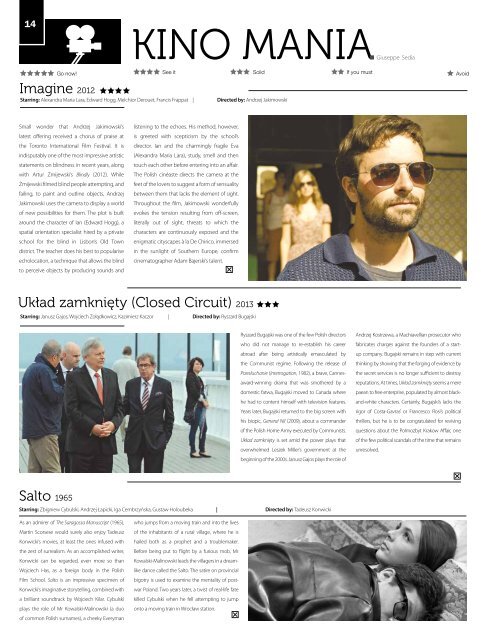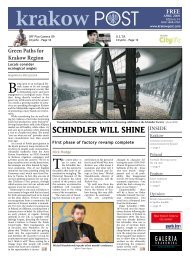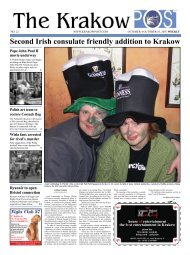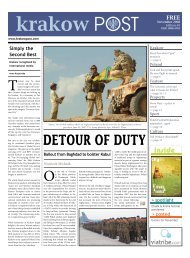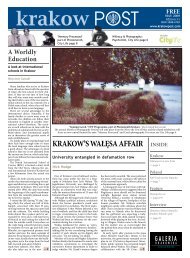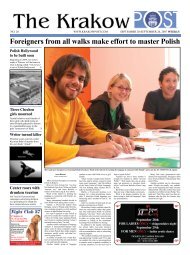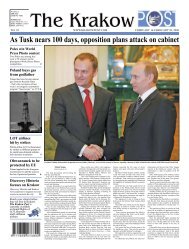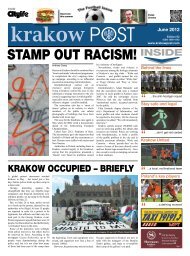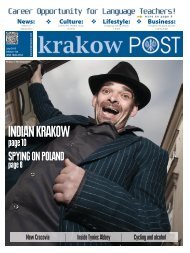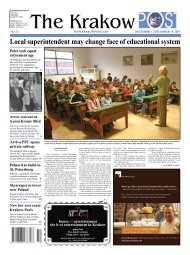News: Culture: Lifestyle: Business: Krakow ... - Krakow Post
News: Culture: Lifestyle: Business: Krakow ... - Krakow Post
News: Culture: Lifestyle: Business: Krakow ... - Krakow Post
You also want an ePaper? Increase the reach of your titles
YUMPU automatically turns print PDFs into web optimized ePapers that Google loves.
14<br />
■ Giuseppe Sedia<br />
Go now!<br />
See it<br />
Solid<br />
If you must<br />
Avoid<br />
Imagine 2012<br />
Starring: Alexandra Maria Lara, Edward Hogg, Melchior Derouet, Francis Frappat |<br />
Directed by: Andrzej Jakimowski<br />
Small wonder that Andrzej Jakimowski’s<br />
latest offering received a chorus of praise at<br />
the Toronto International Film Festival. It is<br />
indisputably one of the most impressive artistic<br />
statements on blindness in recent years, along<br />
with Artur Żmijewski’s Blindly (2012). While<br />
Żmijewski filmed blind people attempting, and<br />
failing, to paint and outline objects, Andrzej<br />
Jakimowski uses the camera to display a world<br />
of new possibilities for them. The plot is built<br />
around the character of Ian (Edward Hogg), a<br />
spatial orientation specialist hired by a private<br />
school for the blind in Lisbon’s Old Town<br />
district. The teacher does his best to popularise<br />
echolocation, a technique that allows the blind<br />
to perceive objects by producing sounds and<br />
listening to the echoes. His method, however,<br />
is greeted with scepticism by the school’s<br />
director. Ian and the charmingly fragile Eva<br />
(Alexandra Maria Lara), study, smell and then<br />
touch each other before entering into an affair.<br />
The Polish cinéaste directs the camera at the<br />
feet of the lovers to suggest a form of sensuality<br />
between them that lacks the element of sight.<br />
Throughout the film, Jakimowski wonderfully<br />
evokes the tension resulting from off-screen,<br />
literally out of sight, threats to which the<br />
characters are continuously exposed and the<br />
enigmatic cityscapes à la De Chirico, immersed<br />
in the sunlight of Southern Europe, confirm<br />
cinematographer Adam Bajerski’s talent.<br />
Układ zamknięty (Closed Circuit) 2013<br />
Starring: Janusz Gajos, Wojciech Żołądkowicz, Kazimierz Kaczor | Directed by: Ryszard Bugajski<br />
Ryszard Bugajski was one of the few Polish directors<br />
who did not manage to re-establish his career<br />
abroad after being artistically emasculated by<br />
the Communist regime. Following the release of<br />
Przesłuchanie (Interrogation, 1982), a brave, Cannesaward-winning<br />
drama that was smothered by a<br />
domestic fatwa, Bugajski moved to Canada where<br />
he had to content himself with television features.<br />
Years later, Bugajski returned to the big screen with<br />
his biopic, General Nił (2009), about a commander<br />
of the Polish Home Army executed by Communists.<br />
Układ zamknięty is set amid the power plays that<br />
overwhelmed Leszek Miller’s government at the<br />
beginning of the 2000s. Janusz Gajos plays the role of<br />
Andrzej Kostrzewa, a Machiavellian prosecutor who<br />
fabricates charges against the founders of a startup<br />
company. Bugajski remains in step with current<br />
thinking by showing that the forging of evidence by<br />
the secret services is no longer sufficient to destroy<br />
reputations. At times, Układ zamknięty seems a mere<br />
paean to free enterprise, populated by almost blackand-white<br />
characters. Certainly, Bugajski’s lacks the<br />
rigor of Costa-Gavras’ or Francesco Rosi’s political<br />
thrillers, but he is to be congratulated for reviving<br />
questions about the Polmozbyt <strong>Krakow</strong> Affair, one<br />
of the few political scandals of the time that remains<br />
unresolved.<br />
Salto 1965<br />
Starring: Zbigniew Cybulski, Andrzej Łapicki, Iga Cembrzyńska, Gustaw Holoubeka | Directed by: Tadeusz Konwicki<br />
As an admirer of The Saragossa Manuscript (1965),<br />
Martin Scorsese would surely also enjoy Tadeusz<br />
Konwicki’s movies, at least the ones infused with<br />
the zest of surrealism. As an accomplished writer,<br />
Konwicki can be regarded, even more so than<br />
Wojciech Has, as a foreign body in the Polish<br />
Film School. Salto is an impressive specimen of<br />
Konwicki’s imaginative storytelling, combined with<br />
a brilliant soundtrack by Wojciech Kilar. Cybulski<br />
plays the role of Mr Kowalski-Malinowski (a duo<br />
of common Polish surnames), a cheeky Everyman<br />
who jumps from a moving train and into the lives<br />
of the inhabitants of a rural village, where he is<br />
hailed both as a prophet and a troublemaker.<br />
Before being put to flight by a furious mob, Mr<br />
Kowalski-Malinowski leads the villagers in a dreamlike<br />
dance called the Salto. The satire on provincial<br />
bigotry is used to examine the mentality of postwar<br />
Poland. Two years later, a twist of real-life fate<br />
killed Cybulski when he fell attempting to jump<br />
onto a moving train in Wrocław station.


